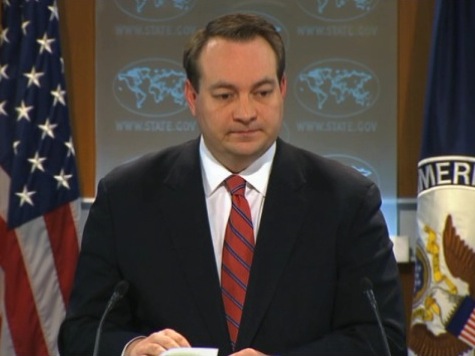Acting Deputy Spokesman Patrick Ventrell told reporters on Monday that he was unaware of anyone in the State Department, including those that testified before Congress about security failures leading up to the Benghazi attack, of any “whistleblowers” within the Department. This is an important designation because employees who are considered whistleblowers have access to counsel and protections under the law. The Spokesman said that he was not aware of any announcements made to employees informing them of their rights to counsel and legal protections should they decide to become a “whistleblower” in this incident.
Transcript:
QUESTION: Your earlier answer to me specified that you were – you had not heard of any private counsel seeking security clearances.
MR. VENTRELL: Right.
QUESTION: Are you aware of any State Department employees who are – who would fall under the category of whistleblower in connection with Benghazi who have been denied access to papers?
MR. VENTRELL: Not that I’m aware of.
QUESTION: And one last question: Has the Department issued to its employees any kind of notice that would ensure that anyone who considers himself or herself a whistleblower in this matter would not be subject to any kind of repercussion?
MR. VENTRELL: I’m not sure of a proactive notice saying one way or another, but we always say that to whistleblowers, that they have the Inspector General and other methods of whistleblowing on any range of issues. So that’s a longstanding process that stands for a number of different scenarios.
QUESTION: Thank you.
QUESTION: Excuse me. I’m trying to get my thoughts together.
MR. VENTRELL: Go ahead, Matt.
QUESTION: See, I haven’t seen this letter from Representative Issa, so I don’t know what it is, but the term has been used over and over, “whistleblower.” Does the State Department believe that there is anything in the Benghazi incident to blow a whistle on? Is – in other words, the question before was – I believe the question before was something like: Does the State Department believe that there are people who have gone to the Hill or otherwise given information that would put them in the category of being a whistleblower, which generally refers to people who report corruption or some kind of malfeasance or incompetence? Does the State Department believe that there are people involved in the Benghazi case who could be – who are considered whistleblowers?
MR. VENTRELL: I’m not aware of whistleblowers one way or another.
QUESTION: So why do you continue to use – you’re accepting the premise of the question, which is that there are whistleblowers. And if you –
MR. VENTRELL: No, I’m not accepting the –
QUESTION: — think there are, that’s fine.
MR. VENTRELL: No, I’m not accepting the premise of the question. That was Mr. Rosen’s characterization, not mine.
QUESTION: So the Department does not believe that there is anyone that falls – anyone connected to the Benghazi case, for example, the people who testified before the committee that Representative Issa chairs, back on the first hearing months ago, the Department does not consider those people to be whistleblowers under the definition that most of us would understand?
MR. VENTRELL: Right. Not that I’m aware of. I mean, I can’t rule out a negative. I can’t say for certain one way or another that there aren’t people out there. But not that I’m aware of and not that have been – the folks that you’re talking about. I think this comes in the context of some members of the Hill wanting to interview survivors or something of that nature, and the bottom line is those survivors have provided extensive testimony to the ARB and to the FBI, and those – that information was made available to the Hill through that channel. We don’t sort of have people at the operational level necessarily as witnesses or testifying. In fact, many of them are back and have done – and are completing their duties in the field.
QUESTION: No, this just has to do with the definition of the word “whistleblower.” I mean, if you don’t believe that there was any wrongdoing, any illegality involved, then you wouldn’t consider people involved in this case to be whistleblowers. Am I correct?
MR. VENTRELL: Right. That’s not the phrase we’ve used. In terms of they are –
QUESTION: No, but that’s the phrase that – if I understood correctly, that’s the phrase that’s used in the letter, yes?
QUESTION: Yes, it’s used in the letter, and with respect to the question I asked, I simply referred to individuals who may be placed under that category.
QUESTION: Oh, okay. Would you –
QUESTION: The State Department is so recognizing them.
QUESTION: Does the State Department recognize people involved in this incident – some people to be whistleblowers?
MR. VENTRELL: No, not that I’m aware of. I’m happy to look into it, but not that I’m aware of, and we’ll get back to the Hill and respond to their inquiry in written format as we always do.

COMMENTS
Please let us know if you're having issues with commenting.